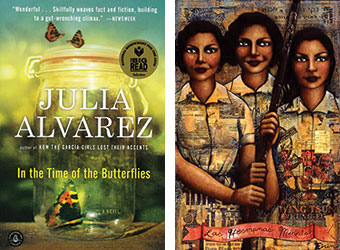Babel: Julia Alvarez
by Barbara Cole


As Women’s History Month draws to a close, Just Buffalo Literary Center is gearing up to welcome prize-winning author Julia Alvarez on April 3 at Kleinhans Music Hall as the last speaker in their BABEL season. Though March may be the single month designated to honor women, Alvarez’s historical novel, In the Time of the Butterflies, demonstrates that the role women play in history cannot be relegated to a separate category.
In the Time of the Butterflies—the text selected by Just Buffalo as the focus for BABEL—tells the real-life story of the Mirabal sisters—Patria, Minerva, and María Teresa—whose opposition to General Rafael Leonidas Trujillo’s dictatorship led to their imprisonment and murder. Their codename, “Las Mariposas” or “The Butterflies,” inspired the title of Alvarez’s widely acclaimed novel. The book is dedicated to Dedé Mirabal—the fourth and only surviving sister—who committed her life to preserving her sisters’ memory following their death.
There’s no spoiler here: Knowing that the women die in the end is only the beginning of this gut-wrenching tale. Alvarez offers readers a glimpse into their living as much as their dying as a testament to the importance of freedom and democracy. Their story cannot—and should not—be forgotten.
Even today, more than 50 years since their deaths, the Mirabals hold iconic status in the Dominican Republic. One can spot tributes to Las Mariposas on posters, in graffiti, or more officially at Museo Hermanas Mirabal, a museum located in the home where they spent their final days. Visitors can see the family’s graves and view relics which run the spectrum from the macabre (the long braid of hair that Dedé rescued from María Teresa’s head in the morgue) to touching (baby clothes the women sewed in prison for the six children left orphaned by their assassinations).
Despite the privileged place that “the sisters” hold among Dominicans, their story has not necessarily permeated Americans’ awareness. Alvarez’s novel seeks to correct that lack. In the United States, news of the massacre was reported in the December 12, 1960 issue of Time magazine. Nonetheless, few Americans today are aware of the 30-year dictatorship of Trujillo nor of the US’s potential role in keeping him in power. But Julia Alvarez remembers seeing that magazine article as a 10-year-old girl, struck by how eerily close her own fate might have been to the Mirabals.
Born in New York City in 1950, Alvarez’s family returned to the Dominican Republic when she was just three months old. She spent the first 10 years of her life there, until her family was forced to flee after a failed coup against Trujillo. Alvarez’s father had been affiliated with the same underground resistance movement as the Mirabal sisters, escaping just months before the Mirabal sisters were slaughtered.
Throughout her life, Alvarez felt haunted by the Mirabal legacy but it took more than three decades before she was ready to tell their story. Earning numerous awards and fame for her semi-autobiographical debut novel, How the Garcia Girls Lost Their Accents, Alvarez knew that tackling the Mirabals would prove a particularly demanding challenge. Reflecting on this arduous task in her essay, “Chasing the Butterflies,” Alvarez writes: “The story seemed to me almost impossible to write. It was too perfect, too tragic, too awful. The girls’ story didn’t need a story. And besides, I couldn’t imagine how one tells a story like this. Once upon a holocaust, there were three butterflies.”
Once Alvarez met Dedé, however, she overcame her initial trepidation and committed herself to writing the novel in order to “understand the living, breathing women who had faced all the difficult challenges and choices of those terrible years. I believed that only by making them real, alive, could I make them mean anything to the rest of us.”
Alvarez succeeds in pulling these heroines from the pages of history to portray them as real women, masterfully creating four distinct characters whose lives are revealed through intimate details and memorable moments. Based on historical events, Alvarez’s book is still very much a page-turner, full of plot twists and gut-wrenching suspense. “A novel is not, after all, a historical document,” Alvarez notes in her postscript, “but a way to travel through the human heart.”
The martyrdom of the Mirabal sisters has not been in vain. The date of their massacre, November 25, has been recognized by the United Nations as the International Day for the Elimination of Violence against Women. Alvarez herself has instituted a tradition of wearing a butterfly on that day as a symbolic remembrance.
Julia Alvarez will speak about her impressive body of work—nearly 20 titles in all including novels, books for children and young adults, non-fiction and poetry—in her lecture at Kleinhans, followed by a Q&A with questions from the audience and a book signing.
It promises to be an especially exciting event. Not only will the 2013-14 BABEL season be announced—one of Just Buffalo’s best kept secrets—but Mayor Byron Brown will be on hand to issue a mayoral proclamation for Alvarez.
For more information about Just Buffalo’s BABEL series or to reserve tickets, call 832-5400 or visit www.justbuffalo.org.
blog comments powered by Disqus|
Issue Navigation> Issue Index > v12n13 (Week of Thursday, March 28) > Lit City > Babel: Julia Alvarez This Week's Issue • Artvoice Daily • Artvoice TV • Events Calendar • Classifieds |









 Current Issue
Current Issue